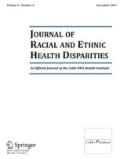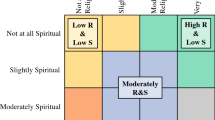Abstract
Despite years of research aimed at decreasing the cancer mortality rates, the disparity between African-Americans and whites continues to grow. The fundamental psychosocial and belief differences that may mediate these disparities are poorly studied and rarely disentangle race versus specific socioeconomic status (SES) effects. In this study, breast, colon, and lung cancer patients presenting for their first oncology appointment completed a self-administered survey utilizing previously validated instruments regarding psychosocial and belief factors. Results were analyzed by self-identified race, income, and education. In total, 161 African-American (37 %) and 269 white (63 %) new oncology patients with breast (47 %), colon (16 %), or lung (37 %) cancer enrolled. African-Americans were more likely to be in the US$<20,000 income group (45 vs. 9 %) but 21 % had incomes US$>60,000. Apparent racial differences in health literacy and cancer knowledge were primarily mediated by income and education. Significant racial differences in God’s perceived role in their cancer remained after adjustments for income and education with African-Americans more likely to feel that God was in control of their cancer (67 vs. 30 %). These findings suggest the need for a more nuanced understanding of how race and socioeconomic status exert both independent and interrelated effects in the health care setting. Only then can effective interventions that reduce disparities in survival be designed. This study adds further substantive evidence to the crucial importance of God’s perceived role in the cancer experience for African-Americans. An important area for future research is to examine whether these racial differences in religious belief are also associated with differences in health-related behavior and medical decision-making.

Similar content being viewed by others
References
NNA Howlader, M Krapcho, J Garshell, N Neyman, SF Altekruse, CL Kosary, M Yu, J Ruhl, Z Tatalovich, H Cho, A Mariotto, DR Lewis, HS Chen, EJ Feuer, KA Cronin (eds). SEER cancer statistics review, 1975-2010, National Cancer Institute. Bethesda, MD, http://seer.cancer.gov/csr/1975_2010/, based on November 2012 SEER data submission, posted to the SEER web site, 2013.
Eley JW, Hill HA, Chen VW, Austin DF, Wesley MN, Muss HB, et al. Racial differences in survival from breast cancer. Results of the National Cancer Institute Black/White Cancer Survival Study. JAMA. 1994;272(12):947–54.
Marcella S, Miller JE. Racial differences in colorectal cancer mortality. The importance of stage and socioeconomic status. J Clin Epidemiol. 2001;54(4):359–66.
Baldwin LM, Dobie SA, Billingsley K, Cai Y, Wright GE, Dominitz JA, et al. Explaining black-white differences in receipt of recommended colon cancer treatment. J Natl Cancer Inst. 2005;97(16):1211–20.
Bach PB, Cramer LD, Warren JL, Begg CB. Racial differences in the treatment of early-stage lung cancer. N Engl J Med. 1999;341(16):1198–205. doi:10.1056/NEJM199910143411606.
Gehlert S, Colditz GA. Cancer disparities: unmet challenges in the elimination of disparities. Cancer Epidemiol biomarkers Prev Publ Am Assoc Cancer Res Am Soc Prev Oncol. 2011;20(9):1809–14. doi:10.1158/1055-9965.EPI-11-0628.
Gordon NH. Socioeconomic factors and breast cancer in black and white Americans. Cancer Metastasis Rev. 2003;22(1):55–65.
Airhihenbuwa CO. Health and culture: beyond the western paradigm. Thousand Oaks, CA: Sage Publications; 1995.
Airhihenbuwa CO. On being comfortable with being uncomfortable: centering an Africanist vision in our gateway to global health. Health Educ Behav Off Publ Soc Publ Health Educ. 2007;34(1):31–42. doi:10.1177/1090198106291377.
Airhihenbuwa CO, Webster JD. Culture and African contexts of HIV/AIDS prevention, care and support. SAHARA J J Soc Aspects of HIV/AIDS Res Alliance/SAHARA, Human Sci Res Counc. 2004;1(1):4–13. doi:10.1080/17290376.2004.9724822.
Advani AS, Atkeson B, Brown CL, Peterson BL, Fish L, Johnson JL, et al. Barriers to the participation of African-American patients with cancer in clinical trials: a pilot study. Cancer. 2003;97(6):1499–506.
Guidry JJ, Matthews-Juarez P, Copeland VA. Barriers to breast cancer control for African-American women: the interdependence of culture and psychosocial issues. Cancer. 2003;97(1 Suppl):318–23.
Barroso J, McMillan S, Casey L, Gibson W, Kaminski G, Meyer J. Comparison between African-American and white women in their beliefs about breast cancer and their health locus of control. Cancer Nurs. 2000;23(4):268–76.
Lannin DR, Mathews HF, Mitchell J, Swanson MS, Swanson FH, Edwards MS. Influence of socioeconomic and cultural factors on racial differences in late-stage presentation of breast cancer. JAMA. 1998;279(22):1801–7.
Margolis ML, Christie JD, Silvestri GA, Kaiser L, Santiago S, Hansen-Flaschen J. Racial differences pertaining to a belief about lung cancer surgery: results of a multicenter survey. Ann Intern Med. 2003;139(7):558–63.
Sentell TL, Halpin HA. Importance of adult literacy in understanding health disparities. J Gen Intern Med. 2006;21(8):862–6. doi:10.1111/j.1525-1497.2006.00538.x.
Corbie-Smith G, Thomas SB, St George DM. Distrust, race, and research. Arch Intern Med. 2002;162(21):2458–63.
Jacobs EA, Rolle I, Ferrans CE, Whitaker EE, Warnecke RB. Understanding African Americans’ views of the trustworthiness of physicians. J Gen Intern Med. 2006;21(6):642–7.
Smedley BDSA, Nelson AR, editors. Unequal treatment: confronting racial and ethnic disparities in health care. Washington, D.C.: The National Academies Press; 2003.
Kinney AY, Bloor LE, Martin C, Sandler RS. Social ties and colorectal cancer screening among Blacks and Whites in North Carolina. Cancer Epidemiol Biomarkers Prev Publ Am Assoc Cancer Res Am Soc Prev Oncol. 2005;14(1):182–9.
Powe BD. Fatalism among elderly African Americans. Effects on colorectal cancer screening. Cancer Nurs. 1995;18(5):385–92.
Wallston KA, Stein MJ, Smith CA. Form C of the MHLC scales: a condition-specific measure of locus of control. J Pers Assess. 1994;63(3):534–53.
Derogatis LR. The brief symptom inventory: an introductory report. Psychol Med. 1983;13(3):595–605.
Wallston KA, Malcarne VL, Flores L, Hansdottir I, Smith CA, Stein MJ, et al. Does God determine your health? The God Locus of Health Control Scale. Cogn Ther Res. 1999;23(2):131–42. doi:10.1023/a:1018723010685.
Sherbourne CD, Stewart AL. The MOS social support survey. Soc Sci Med. 1991;32(6):705–14.
Singh JA, Sloan JA, Atherton PJ, Smith T, Hack TF, Huschka MM, et al. Preferred roles in treatment decision making among patients with cancer: a pooled analysis of studies using the Control Preferences Scale. Am J Manage Care. 2010;16(9):688–96.
Rose A, Peters N, Shea JA, Armstrong K. Development and testing of the health care system distrust scale. J Gen Intern Med. 2004;19(1):57–63.
Wallace LS, Rogers ES, Roskos SE, Holiday DB, Weiss BD. Brief report: screening items to identify patients with limited health literacy skills. J Gen Intern Med. 2006;21(8):874–7. doi:10.1111/j.1525-1497.2006.00532.x.
Sangha O, Stucki G, Liang MH, Fossel AH, Katz JN. The self-administered comorbidity questionnaire: a new method to assess comorbidity for clinical and health services research. Arthritis Rheum. 2003;49(2):156–63.
Tammemagi CM, Nerenz D, Neslund-Dudas C, Feldkamp C, Nathanson D. Comorbidity and survival disparities among black and white patients with breast cancer. J Am Med Assoc. 2005;294(14):1765–72.
Levin JS, Taylor RJ, Chatters LM. Race and gender differences in religiosity among older adults: findings from four national surveys. J Gerontol. 1994;49(3):S137–45.
Taylor RJ, Chatters LM, Jackson JS. Religious and spiritual involvement among older african americans, Caribbean blacks, and non-Hispanic whites: findings from the national survey of american life. J Gerontol Series B, Psychol Sci Soc Sci. 2007;62(4):S238–50.
Ashing-Giwa KT, Padilla G, Tejero J, Kraemer J, Wright K, Coscarelli A, et al. Understanding the breast cancer experience of women: a qualitative study of African American, Asian American, Latina and Caucasian cancer survivors. Psycho-Oncology. 2004;13(6):408–28. doi:10.1002/pon.750.
Canada AL, Fitchett G, Murphy PE, Stein K, Portier K, Crammer C, et al. Racial/ethnic differences in spiritual well-being among cancer survivors. J Behav Med. 2012. doi:10.1007/s10865-012-9439-8.
Lee MM, Lin SS, Wrensch MR, Adler SR, Eisenberg D. Alternative therapies used by women with breast cancer in four ethnic populations. J Natl Cancer Inst. 2000;92(1):42–7.
Levine EG, Yoo G, Aviv C, Ewing C, Au A. Ethnicity and spirituality in breast cancer survivors. J Cancer Surviv. 2007;1(3):212–25. doi:10.1007/s11764-007-0024-z.
Hill PC, Pargament KI. Advances in the conceptualization and measurement of religion and spirituality. Implications for physical and mental health research. Am Psychol. 2003;58(1):64–74.
Pargament K, Kennell J, Hathaway W. Religion and the problem-solving process: three styles of coping. J Sci Study Relig. 1988;27(1):90–104.
Pargament KI, Koenig HG, Perez LM. The many methods of religious coping: development and initial validation of the RCOPE. J Clin Psychol. 2000;56(4):519–43. doi:10.1002/(sici)1097-4679(200004)56:4 < 519::aid-jclp6 > 3.0.co;2-1.
Smith AK, McCarthy EP, Paulk E, Balboni TA, Maciejewski PK, Block SD, et al. Racial and ethnic differences in advance care planning among patients with cancer: impact of terminal illness acknowledgment, religiousness, and treatment preferences. J Clin Oncol Off J Am Soc Clin Oncol. 2008;26(25):4131–7. doi:10.1200/JCO.2007.14.8452.
Zavala MW, Maliski SL, Kwan L, Fink A, Litwin MS. Spirituality and quality of life in low-income men with metastatic prostate cancer. Psycho-Oncology. 2009;18(7):753–61. doi:10.1002/pon.1460.
Umezawa Y, Lu Q, You J, Kagawa-Singer M, Leake B, Maly RC. Belief in divine control, coping, and race/ethnicity among older women with breast cancer. Ann Behav Med Publ Soc Behav Med. 2012;44(1):21–32. doi:10.1007/s12160-012-9358-5.
Gullatte MM, Brawley O, Kinney A, Powe B, Mooney K. Religiosity, spirituality, and cancer fatalism beliefs on delay in breast cancer diagnosis in African American women. J Relig Health. 2010;49(1):62–72. doi:10.1007/s10943-008-9232-8.
Author information
Authors and Affiliations
Corresponding author
Ethics declarations
This article does not contain any studies with animals performed by any of the authors. All procedures performed in studies involving human participants were in accordance with the ethical standards of the institutional and/or national research committee and with the 1964 Helsinki declaration and its later amendments or comparable ethical standards. Oral informed consent was obtained from all individual participants included in the study.
Funding
This study was funded by the Conquer Cancer Foundation CDA (BNP).
Conflict of Interest
The authors declare that they have no conflict of interest.
Additional information
Supported by the Conquer Cancer Foundation Career Development Award (BNP)
Rights and permissions
About this article
Cite this article
Polite, B.N., Cipriano-Steffens, T., Hlubocky, F. et al. An Evaluation of Psychosocial and Religious Belief Differences in a Diverse Racial and Socioeconomic Urban Cancer Population. J. Racial and Ethnic Health Disparities 4, 140–148 (2017). https://doi.org/10.1007/s40615-016-0211-6
Received:
Revised:
Accepted:
Published:
Issue Date:
DOI: https://doi.org/10.1007/s40615-016-0211-6



